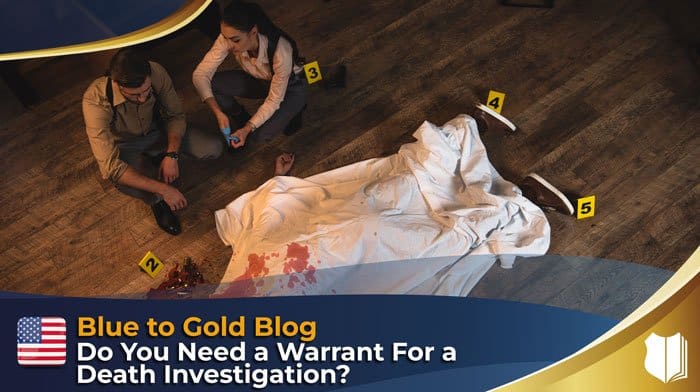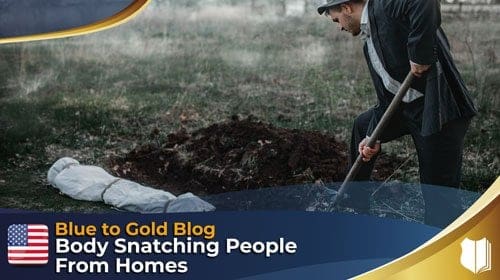

What is the Motor Vehicle Exception?
The automobile, or motor vehicle exception allows officers to search cars for evidence, contraband, and fruits or instrumentalities of crimes without a search warrant. When
or use our live chat
Customer Service


Today’s question comes from an officer in Utah, and the officer basically asked, “Do we need a warrant for a death investigation?” Let’s go through this.
The officer says, “Look, we we get into the house because we have exigency. You know that there’s somebody deceased in the home.” Let’s say that the cleaning person comes, and they call and the homeowner is dead. Alright. So they said that they cannot get a hold of anybody with standing in order to continue the death investigation.
The cleaning person is a good example. The cleaning person, generally speaking, cannot let you just search around the home, because they don’t have enough of a privacy interest in the home to allow you to have free rein of the house.
The police want to look to see if the death is suspicious. If they suspect it’s from natural causes, they will want to locate prescription bottles, or a doctor’s information to try to see how their health was, and if the person has been to a doctor within the last 30 days, and so forth.
So the question is, “Does this require a warrant?” And the general answer is, “No.”
Regarding death investigations, if there’s no foul play and you’re trying to determine the cause of death, and you are in the home lawfully, you’re basically playing coroner. Generally speaking, these are not criminal investigations. You’re basically playing coroner. You’re trying to find out medical issues, prescriptions, and so on. You’re trying to help find the cause of death.
Because that is not a criminal investigation, the US Supreme Court case in Mincy, versus Arizona doesn’t apply. Mincy is a standard for the proposition that if you are in a murder scene, right inside of a home, the murder itself, obviously a very serious crime, in and of itself is not going to allow you to search the residence for evidence of the murder without either consent, or a warrant. There is no murder scene exception to the search warrant requirement.
But we don’t have that here. Officers are in the home, and they’re just trying to find the cause of death. There is no murder. Now, obviously, if you find evidence of foul play, well, then you, you need to get a warrant. But also realize that there may not be any standing by the person who ends up being the suspect. You may have a murderer saying, “Go get a warrant.”
But another thing that happens with these unattended deaths is that the people live alone. Well, let’s say that there’s some foul play involved by the neighbor, or somebody else, a friend and so forth, who visits and ends up, poisoning the victim.
Well, does the friend or the neighbor have standing in order to challenge the search that did occur without a warrant? And the answer is, “most likely not,” unless they keep a bunch of stuff there, they have free rein of the house, they’ve been given a key by the homeowner, and they can come and go as they please. They stay the night, frequently. But if that’s not the case, which it is mostly, then they don’t have any standing. So that’s kind of where we’re at here.
So, as a former law enforcement officer, I’ve been on plenty of unattended deaths. I’ve been on both, where they live alone, there’s no warrant, we’re going to get there because normally there’s no foul play. We’re just trying to confirm that there’s no foul play.
And also, you know, you have cases where even if they don’t live alone, the other person that lives there is usually the one that called the police. So if they live there, and they’re calling the police, don’t forget that they likely gave you expressed or implied consent to come into the home. Let’s say it’s the wife and her husband died. That’s why she’s calling the police. If she’s standing there, or sitting in the living room, and talking to the investigators and so forth, and not telling everybody get the hell out of their house, that is also consent. It’s part of the consent. She allowed you in. She’s allowing you stay in there. So there’s consent. And again, you wouldn’t need a warrant if you had valid consent from somebody who could give it.
There’s your role. So the takeaway here is that for unintended deaths, normally no warrant is needed as long as you’re lawfully in the residence. And once you have evidence that there’s foul play involved, timeout; go get a warrant. That’s what I would say. All right, there’s your answer. It’s a good question and hopefully, this answer helps.


The automobile, or motor vehicle exception allows officers to search cars for evidence, contraband, and fruits or instrumentalities of crimes without a search warrant. When


These three golden rules come from reading thousands of court cases over the last 20 years and seeing a theme regarding what the courts are


This question is: Can you look inside a woman’s purse, or a man’s backpack during a pat down? The answer is, “Maybe.” Here’s how this


Here is the question: Can an officer reach slightly into a person’s home to pull them out and arrest them? If an officer has probable
© Blue to Gold, LLC. All rights reserved